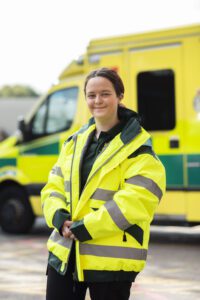
According to recent figures, there are around 12,000 adults registered as deaf or hard of hearing in the Greater Manchester area, plus an additional half a million suffering from some kind of hearing loss, ranging from mild to acute. This community makes up a sizable percentage of potential patients for emergency service workers and that means that being able to communicate with them is now a crucial workplace skill.
As part of the GMCA Skills for Growth programme, Seetec Outsource are working with the Manchester Stress Institute (MSI) to provide a fully funded British Sign Language course for those individuals working in emergency services, teaching key medical terms and phrases, to help communicate with deaf patients in emergency scenarios.
Holly Parker, 21, is at university, training to be a paramedic and is working with MSI to provide some of the content that makes up the online BSL course. Holly was born deaf and has used two hearing aids for most of her life, meaning she has first-hand experience of the kind of challenges people in the deaf community can face with communication. She has now become a passionate advocate for the community, raising awareness of the importance of diversifying means of communication to include those with hearing difficulties.

Holly explained: “It really started properly once I left secondary school; I was the only deaf kid in the whole school and so I struggled at times, both socially and academically. This made me want to know more about the issues in general and how my own experiences could help. I first got involved with a campaign pushing for more subtitled movie options at the cinema and I’ve now gone on to speak at conferences, been interviewed on GMB news and done a lot of work with the National Deaf Children’s Society.”
In relating the issues facing the deaf community specifically to emergency services, Holly is also an expert, both through her own experiences as a paramedic, as well as the fact she is currently writing her dissertation on the impact of different communication on deaf and non-English speaking service users. “Given that anyone who is calling 999 is clearly going to be in distress or anxious anyway, to add the barrier of communication on top of that really doesn’t help- it quite often leads to patients not being able to explain what the problem is. That’s why the British Sign Language course is so important.”
Holly’s part of the course involves the following: “I’m going to be talking about how best to communicate with a deaf person and my experience as a deaf paramedic. Even though I can speak and I only know the basics of BSL, I still understand first-hand how valuable it can be to a huge number of patients.”
One of the examples Holly gave of this first-hand experience was one time she had to comfort and communicate with a deaf patient while on shift on the ambulance: “I found out whether she was a signer or whether she’d prefer writing things down, I made sure I was facing her and that she could clearly see my mouth in case she wanted to read my lips and I provided a lot of reassurance as I knew she was incredibly worried. It’s often a combination of things that help and I was able to understand her and pass on the necessary information to the rest of my team.”
As part of the BSL course, participants will be equipped with some of these basic skills to be able to match what Holly managed with her patient. They will be able to sign the BSL alphabet, introduce themselves and sign their name, which will be invaluable in building relationships with deaf patients.
To sign up, or find out more about the BSL course, please fill in the form on this link: Skills for Growth – Blue Light Academy (Greater Manchester) | Seetec Outsource
* Skills for Growth is funded through the European Social Fund and aims to plug the skills gaps in priority sectors across Greater Manchester as outlined in the Combined Authority’s Local Industrial Strategy.



